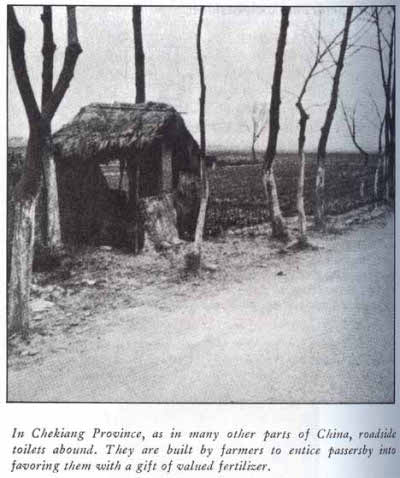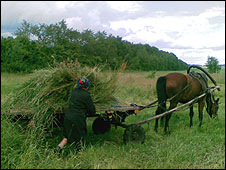
Humanure and other fertilizers in China
 I have to admit that my
primary goal in reading Farmers
of Forty Centuries
was to discover whether farmers really put outhouses along public
roads, hoping to trap travelers into depositing their wastes
therein. The book gave me a resounding yes, and noted that
contractors also paid for the privilege of removing human waste from
cities so that they could sell the precious substance to farmers.
Humanure was often diluted with water and applied directly to fields or
dried and then applied in a powder form.
I have to admit that my
primary goal in reading Farmers
of Forty Centuries
was to discover whether farmers really put outhouses along public
roads, hoping to trap travelers into depositing their wastes
therein. The book gave me a resounding yes, and noted that
contractors also paid for the privilege of removing human waste from
cities so that they could sell the precious substance to farmers.
Humanure was often diluted with water and applied directly to fields or
dried and then applied in a powder form.
Of course, it took a lot
more than humanure to maintain the fertility of fields for thousands of
years. King saw farmers building huge compost piles, planting
nitrogen fixing plants (especially clovers) as a green manure, and
cutting plants from the hillside and grave mounds to apply to the soil
or to add to their compost piles. Just
like in Central America,  high fertility silt was
excavated from canals and applied to fields, and King noted that the
snails in the canal mud were also important in the fertilizing
campaign. Farmers scavenged animal wastes from the roadsides and
carefully husbanded any wastes from their own livestock, and they also
drained fish ponds at intervals so that they could scoop up the high
quality mud on the pond floor. The addition of ashes from their
cooking fires and all plant residues from their fields rounded out
their organic matter.
high fertility silt was
excavated from canals and applied to fields, and King noted that the
snails in the canal mud were also important in the fertilizing
campaign. Farmers scavenged animal wastes from the roadsides and
carefully husbanded any wastes from their own livestock, and they also
drained fish ponds at intervals so that they could scoop up the high
quality mud on the pond floor. The addition of ashes from their
cooking fires and all plant residues from their fields rounded out
their organic matter.
| This post is part of our Traditional Asian Farming lunchtime series.
Read all of the entries: |
Want more in-depth information? Browse through our books.
Or explore more posts by date or by subject.
About us: Anna Hess and Mark Hamilton spent over a decade living self-sufficiently in the mountains of Virginia before moving north to start over from scratch in the foothills of Ohio. They've experimented with permaculture, no-till gardening, trailersteading, home-based microbusinesses and much more, writing about their adventures in both blogs and books.
Want to be notified when new comments are posted on this page? Click on the RSS button after you add a comment to subscribe to the comment feed, or simply check the box beside "email replies to me" while writing your comment.

Very interesting article.
I come from a long line of farmers, and a line which did not utilize indoor toilets until...well, until after I had moved away anyway. Yet all our humanure was buried as the outhouse was moved from deep hole to deep hole as each was filled up. We did, however, make good use of our cow manure as fertilizer...at least while we had a spreader. This is something I am pushing to finally replace soon. And once I am actually living there again, we'll see about some humanure composting as well, at least for myself.
We had an outhouse when I was a kid too. My hippie father called it a composting toilet, but I don't remember him ever excavating it to use the humanure!
We'll probably post about this eventually, but Mark had a great idea to dig pit latrines in our forest garden/orchard (rather than in our current location at the edge of the woods.) We'll add brown matter the way you do for a composting toilet to prevent anaerobic activity, and we figure when the holes fill up and compost, the tree roots will find them naturally. More on this soon, I hope!
Well, there are two ways to look at that. First, if you're really concerned, you can compost the humanure completely. One of these days I'm going to do a lunchtime series based on the Humanure Handbook, in which author Joseph Jenkins provides scientific data on how safe his composted humanure is.
On the other hand, there are plenty of applications on the homestead where composting probably isn't even necessary. If the waste is buried, you're not likely to cause any problems (unless it's close to a well or spring or creek.) If you use good judgement and use humanure at the base of fruit trees or in other applications where it never touches the food part of the plant, you should be in good shape!